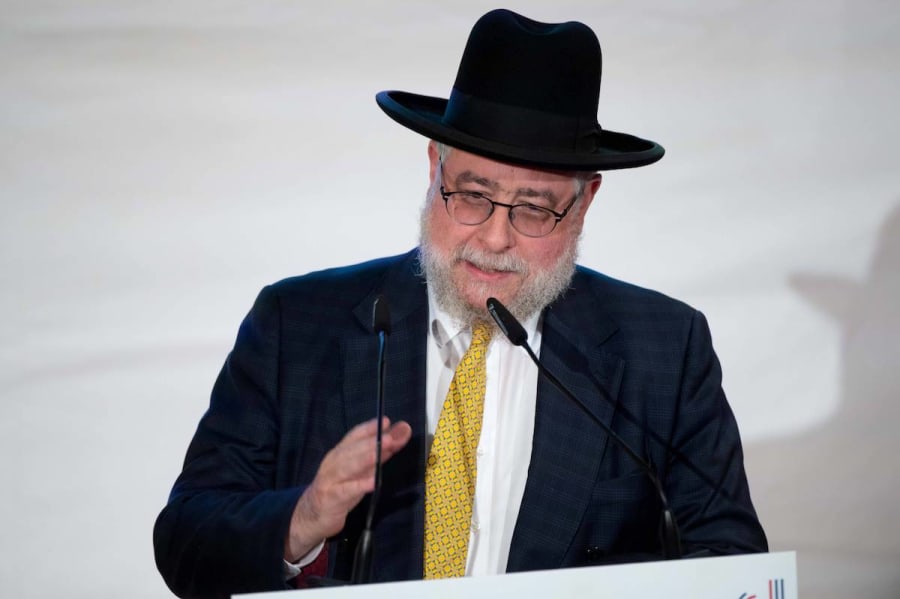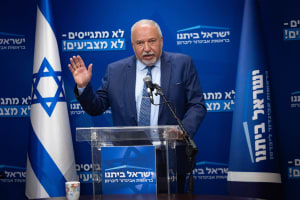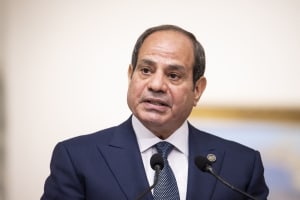Jews must leave Russia or will face persecution, warns exiled Moscow chief rabbi

Former chief rabbi of Moscow Pinchas Goldschmidt warned on Friday that Russian Jews should leave Russia or they will face markedly rising anti-Semitism.
“When we look back over Russian history, whenever the political system was in danger, you saw the government trying to redirect the anger and discontent of the masses towards the Jewish community,” Goldschmidt told The Guardian. “We saw this in tsarist times and at the end of the Stalinist regime.”
“We’re seeing rising anti-Semitism, while Russia is going back to a new kind of Soviet Union, and step by step, the iron curtain is coming down again. This is why I believe the best option for Russian Jews is to leave.”
The Zürich-born Goldschmidt, who served as Moscow’s chief rabbi from 1993 until 2022, left Russia in March after refusing to accommodate a request from Russian state officials to publicly support Russia’s invasion of Ukraine.
“Pressure was put on community leaders to support the war and I refused to do so. I resigned because to continue as chief rabbi of Moscow would be a problem for the community because of the repressive measures taken against dissidents,” Goldschmidt said.
According to Goldschmidt, 25% to 30% of Russia’s 165,000 Jews already left since the war on Ukraine began, or are planning to leave Russia. It is estimated that around 200,000 Russians in all left the country, which is home to 143 million people.
“There’s a section of Russian society called the ‘creacle,’ the creative class of business and cultural leaders, intellectuals and artists,” Goldschmidt said, “and I think it’s safe to say a great percentage of those people have left Russia, which is and will be very detrimental to Russian society.”
It is not the first time that Goldschmidt has warned Russian Jews to flee the country. He did so only a few months ago, in October, after the assistant secretary of the Russian Security Council, Aleksey Pavlov, called the Chabad-Lubavitch Hasidic movement a supremacist cult.
“The main principle of the Lubavitch Hasidim is the superiority of the supporters of the sect over all nations and peoples,” Pavlov wrote.
Pavlov’s comments, in addition to Russia’s threats to close the Jewish Agency in the country, prompted Goldschmidt to call on Russian Jews to leave.
“An attack by the Russian government against Chabad, as well as the attacks against the Jewish Agency for Israel, are anti-Semitic acts against all of us,” Goldschmidt said. “We reiterate our call to all of our brothers and sisters still remaining in Russia and able to leave the country to do so.”
Most of Russia’s rabbis are Lubavitch, including Pinchas Goldschmidt, himself, and Chief Rabbi of Russia Berel Lazar, who remains in the country. The same is the case in all the countries of the former Soviet Union where Jews live today.
The many decades under Communist Soviet rule virtually extinguished all Jewish life in the region and it was Chabad, mainly, which helped rebuild it after the fall of Communism.
Pavlov’s comments created much fear throughout Russian Jewish communities, which recall Soviet and tsarist rule, when anti-Semitism was state policy.
“There’s a huge difference between anti-Semitism and anti-Semitism that’s a policy of the state. For the past few decades, we’ve gotten used to this not being the case, that this was stricken from the political map in Russia, that there’s no official anti-Semitism or discrimination against Jews,” spokesperson for the Russian Jewish community, Baruch Gorin, told the Israeli Public Broadcasting Corporation at the time.
“Now we are under pressure, wondering if what was published in the newspaper – this interview with a top security official – represents the start of an official wave of anti-Semitism,” Gorin said. “I think that would be the end of a Jewish presence in Russia. Official anti-Semitism would drive every Russian Jew out of the country.”

The All Israel News Staff is a team of journalists in Israel.













